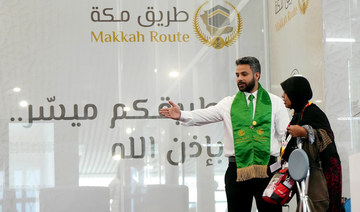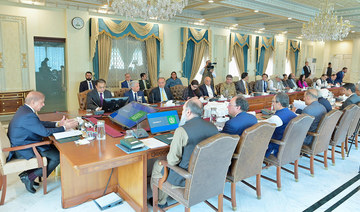NEW DELHI: India started delivering coronavirus vaccines to its neighbors on Wednesday, the foreign ministry said, flagging off a drive to garner goodwill in an often fractious region with the first shipment sent to the tiny Himalayan kingdom of Bhutan.
Bangladesh and Nepal said they expected deliveries on Thursday. The only neighbor absent from India’s list apart from China, is Pakistan, which had not requested assistance, according to an Indian government official.
Many low and middle-income countries are relying on India, the world’s biggest vaccine maker, for supplies to start Covid-19 immunization programs and bring an end to their outbreaks.
“The Pharmacy of the World will deliver to overcome the Covid challenge,” Foreign Minister S. Jaishankar said on Twitter, adding the first vaccine lots had reached Bhutan and the Maldives.
His ministry said on Tuesday “supplies under grant assistance” would be shipped to Bangladesh, Nepal, Myanmar and the Seychelles also. Shipments to Sri Lanka, Afghanistan and Mauritius were awaiting regulatory clearances.
India authorized two vaccines this month for emergency use at home, one licensed from Oxford University and AstraZeneca and another developed at home by Bharat Biotech in partnership with the state-run Indian Council of Medical Research. Both are manufactured locally.
At least two other vaccines are expected to be authorized by India in the next few months.
India initially will only ship the AstraZeneca vaccine, made by the Serum Institute of India, the world’s biggest vaccine maker, which brands the shot as Covishield.
Bangladesh said it expected to receive a gift of two million doses of Covishield from India on Thursday. The country of more than 160 million has yet to start its vaccination program and has ordered a further 30 million doses of the shot.
Nepal said it has been pledged one million doses free of charge by India.
Pakistan has approved for emergency use the Chinese Sinopharm Covid-19 vaccine and another developed by AstraZeneca and Oxford University, but has not got any supplies yet.
India, which has reported the highest number of coronavirus infections after the United States, has so far vaccinated more than 631,417 frontline workers after starting the campaign on Saturday.
The world’s second-most populous country reported on Wednesday 13,823 new cases, taking the total to 10.9m. The number of deaths from the disease rose by 162 to 152,718, data from the health ministry showed.
The government has urged frontline workers not to refuse the vaccines, after almost all states failed to meet their targets in the first few days of the immunization drive.
Many people have declined to take the shots, especially the Bharat Biotech vaccine whose efficacy data from late-stage trials are not known, fearing side-effects.
In a survey conducted by New Delhi-based online platform LocalCircles, 62 percent of 17,000 respondents were hesitant to get vaccinated immediately, mainly due to worries over possible adverse reactions. The government has reported hospitalization from side effects in only 0.002pc of vaccine recipients.
India starts COVID vaccine shipments to neighbors, barring Pakistan and China
https://arab.news/7j38q
India starts COVID vaccine shipments to neighbors, barring Pakistan and China

- Foreign Minister Jaishankar says first vaccine lots had reached Bhutan and Maldives, Bangladesh and Nepal expecting deliveries on Thursday
- Only neighbor absent from India’s list apart from China, is Pakistan, which had not requested assistance, according to Indian officials
Pakistan’s deputy PM, Saudi foreign minister discuss Muslim world issues at OIC summit

- Ishaq Dar stresses the significance of ceasefire in Gaza during his meetings with the Kuwaiti, Qatari and Egyptian FMs
- He also calls for more investment for his country and greater employment opportunities for Pakistanis in the Middle East
ISLAMABAD: Pakistan’s newly appointed Deputy Prime Minister Ishaq Dar met with Saudi Foreign Minister Prince Faisal bin Farhan and other Arab officials on the sidelines of the Organization of Islamic Cooperation (OIC) summit in Gambia on Saturday, emphasizing collective action to address the problems confronting the Muslim world.
The OIC summit is being held against a backdrop of widespread anger over Israel’s military actions in Gaza, which have resulted in the death of nearly 35,000 Palestinians along with a massive destruction of hospitals, schools and residential neighborhoods in the area.
There has been a clear uptick in Islamophobic sentiments and incidents in different parts of the world, particularly since the outset of the conflict last year in October.
The Pakistani deputy prime minister arrived in Gambia on Wednesday to present his country’s perspective on a wide range of issue, including the war in Gaza and the rights situation in the Indian-administered Kashmir.
“Deputy Prime Minister and Foreign Minister Mohammad Ishaq Dar @MIshaqDar50 today met Foreign Minister of Saudi Arabia H.R.H. Prince Faisal bin Farhan Al Saud @FaisalbinFarhan in Banjul, The Gambia,” the foreign office said in a social media post.
“They discussed strengthening strategic and economic relations between Pakistan and Saudi Arabia and enhancing economic cooperation and investment,” it continued. “They called for a ceasefire in Gaza and emphasized the importance of OIC’s role in addressing challenges concerning the Muslim Ummah including Islamophobia and the situations in Palestine and Kashmir.”
Dar also held separate meetings with the foreign ministers of Kuwait, Egypt and Qatar.
During his conversation with Abdullah Ali Al Yahya of Kuwait, he discussed the possibility of further strengthening bilateral cooperation.
He noted the government wanted to transform the “traditionally fraternal ties with Kuwait into a mutually beneficial economic partnership.”
Dar also discussed further consolidation in trade and investment with Qatar’s Sheikh Mohammed bin Abdulrahman Al Thani while seeking more employment opportunities for young Pakistanis.
He emphasized on an immediate ceasefire in Gaza during his interactions for all Arab officials, commending Egypt’s role in supporting international humanitarian assistance for Palestine in his meeting the Egyptian Foreign Minister Sameh Hassan Shoukry.
Pakistan Cricket Board reviews venue upgrades in meeting ahead of ICC Champions Trophy 2025
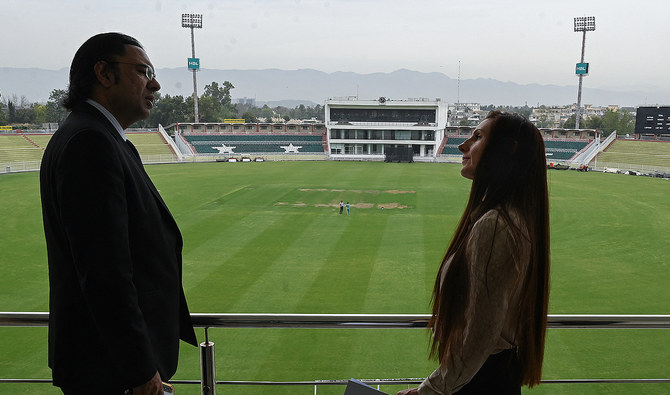
- PCB chairman says upgradation work has been delayed, asks authorities to hire international consultant
- It will be the first major international cricket tournament hosted solely by Pakistan since the 1996 World Cup
ISLAMABAD: The Pakistan Cricket Board (PCB) held a meeting at its headquarters in Lahore to review the upgradation plan for major cricket venues in the country on Saturday ahead of the two-week ICC Champions Trophy next year.
The meeting was presided over by the PCB chairman, Mohsin Naqvi, who directed the relevant officials to immediately hire international consultant to upgrade the Qaddafi Stadium Lahore, National Bank Stadium Karachi and Rawalpindi Stadium.
“The stadium upgradation work has already been delayed,” he observed during the meeting according an official PCB statement, instructing the authorities to speed up the process.
He also instructed to form a three-member committee to ensure the hiring process was carried out in keeping with the rules and regulations.
The PCB plans to provide world-class facilities at the three Pakistani cricket stadiums.
Its upgradation plan includes structural changes to the boxes along with improved facilities and numbered seats for spectators.
Additionally, the number of seats in the enclosures on both sides of the main gate of the Qaddafi Stadium will also be increased.
The PCB chairman directed the replacement of screens for scoreboards and live streaming, instructing the officials to prepare the feasibility to install new floodlights in the stadiums.
The ICC Champions Trophy is scheduled to take place in Pakistan from February to March 2025.
It is expected to be a significant event since it will mark the first major international cricket tournament hosted solely by Pakistan since the 1996 Cricket World Cup.
The tournament will include top-ranked One Day International (ODI) teams, with Pakistan having automatically qualified as the host nation.
‘No illegal Afghan nationals,’ seminary board declares as Pakistan’s Sindh plans crackdown
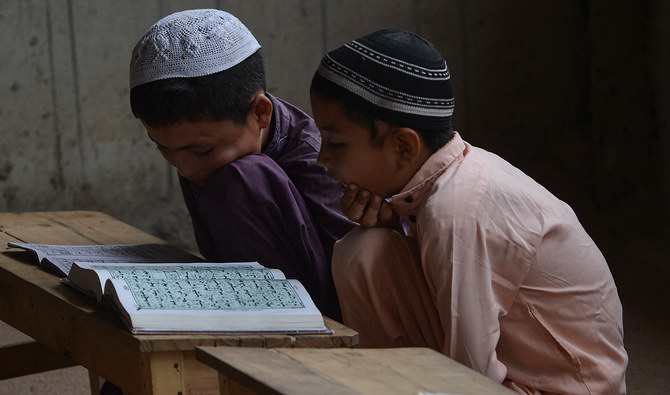
- The province took the decision after a security meeting was told a madrasah teacher was involved in 2023 KPO attack
- Independent analysts say Afghans involve in militant violence arrive from their country and are not residents of Pakistan
KARACHI: Pakistani seminaries have stopped giving admission to Afghan nationals except for those who approach them with the interior ministry’s approval, a top seminary board official informed Saturday, after the country’s southern Sindh province announced to deport illegally enrolled foreigners in seminaries and other educational institutions.
The decision was taken after the province’s apex committee, the top security forum, was briefed earlier this week that one of the individuals involved in the 2023 Karachi Police Office (KPO) attack was a madrasah or seminary teacher. It was also pointed out during the meeting that a number of unregistered foreigners were studying in such institutions in different parts of Sindh.
The 2023 attack was launched by militants, armed with guns and grenades, who stormed the building, leading to a prolonged gunfight with security forces. This confrontation resulted in casualties among both police officers and civilians, along with substantial damage to the police facility. The KPO attack was claimed by the banned militant network Tehreek-e-Taliban Pakistan (TTP), whose leadership is reportedly based in neighboring Afghanistan.
Speaking to Arab News, Maulana Talha Rehmani, spokesperson of Wafaq ul Madaris Al-Arabia Pakistan, said local seminaries had stopping enrolling Afghan nationals almost a year ago.
“Our madrasah used to offer admission to Afghan refugees who possessed proof of registration cards,” he said. “But that also stopped a year ago.”
“Different Pakistani intelligence agencies frequent seminaries for information,” he continued. “Nothing is hidden. The madrasas have a proper system of registration. We are ready to cooperate.”
Rehmani said the authorities had not shared any details with them about the identity of the seminary teacher involved in the KPO attack.
However, Dr. Aamir Tuaseen, former chairman of Pakistan Madrasah Education Board, noted seminaries lacked any coherent policy to develop “a monitoring system” for students.
“Admissions are granted to students without proper background checks,” he told Arab News. “The admission authorities also overlook which province or country does a student belong to, especially in case of Afghanistan.”
He added that boards of religious seminaries should take it upon themselves to grant admission only to students from the city where the seminary is located.
“This will help gather information about the background of every student,” he said, noting the current directorate of religious education did not seem to be fully functional.
The provincial information minister, Sharjeel Inaam Memon, did not respond to a request for comment, but a police official told Arab News on condition of anonymity the madrasah teacher involved in the KPO attack was a Pakistani national.
“The madrasah teacher was identified as Aryadullah who worked with a Karachi-based seminary,” the official said. “He was Pakistani citizen.”
Ihsanullah Tipu Mehsud, a security expert who manages an online publication, The Khorasan Diary, said the Afghan nationals involved in militant violence in Pakistan mostly arrived from the neighboring state and were not residents of Pakistan.
“The involvement of Afghan nationals in acts of terrorism cannot be ignored, but in my opinion, the government’s assertion is overstated,” he said. “The individuals involved in recent acts of terrorism are primarily those who have arrived directly from Afghanistan to carry out attacks rather than Afghan refugees.”
He emphasized any measures related to the expulsion of Afghan students from seminaries should not be driven by a reactionary approach.
“It is critical to implement gradual [seminary] reforms in accordance with the national action plan,” Mehsud said.
Saudi business delegation to arrive in Pakistan Sunday to explore investment opportunities — minister
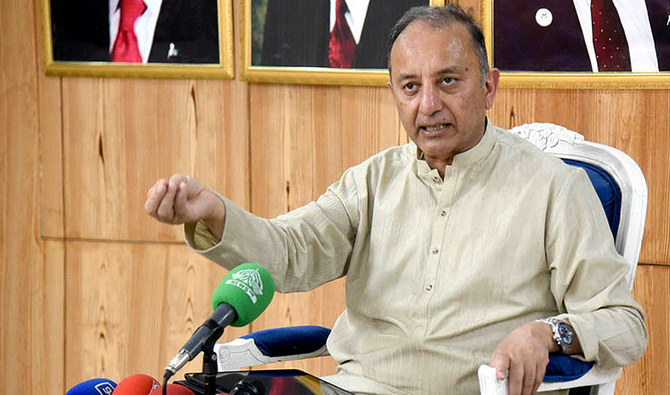
- Musadik Malik says Saudi investment will mainly benefit small technology firms run by young Pakistani students
- He informs the two sides have also discussed a new refinery for export purposes that will help with foreign revenue
ISLAMABAD: A high-level Saudi business delegation is scheduled to arrive in Pakistan tomorrow to explore investment opportunities in various economic sectors by holding meetings with private sector organizations, said Federal Minister for Petroleum Musadik Malik during a media briefing held in Lahore on Saturday.
The two countries have witnessed a flurry of official visits in recent weeks, with Saudi Foreign Minister Prince Faisal bin Farhan traveling to Islamabad earlier in April, before Prime Minister Shehbaz Sharif’s two-day visit to the kingdom to attend a World Economic Forum meeting and hold a number of meetings.
“The Saudi Deputy Investment Minister is visiting Pakistan tomorrow,” said Malik, who is also the focal person for Saudi-Pak bilateral collaboration. “He is bringing representatives from 30 to 35 companies whose CEOs are coming here.”
The Pakistani minister maintained his country had always cherished cordial ties with the kingdom, though it had not managed to turn this “relationship of friendship into a relationship of stability and progress.”
He said Pakistan mostly discussed its financial concerns with the Saudi authorities and requested their support. However, the present government wanted to change that by focusing its bilateral conversations on mutually beneficial progress and development, not aid and assistance.
The minister said the two sides discussed a new refinery project during the recent engagements that would be used for export purposes to earn foreign revenue. Additionally, food security was also discussed to further strengthen Pakistan’s agricultural sector.
He informed that Prime Minister Sharif wanted the country’s “private sector to take the lead on this path to progress.”
“That is why Saudi investors have been invited to come here,” he continued. “They will sit with Pakistani companies and figure out ways to connect the Pakistani talent with the capital and investment needed at the international level for the IT revolution.”
Malik said the bilateral collaboration would primarily benefit small businesses, particularly the technology companies established by young students who were likely to get significant amount of investment from Saudi entrepreneurs.
He expressed optimism that chemical, energy and agricultural companies would also gain advantage from the ongoing bilateral collaboration between the two sides.
Pakistan committee discusses development of border areas in inaugural session
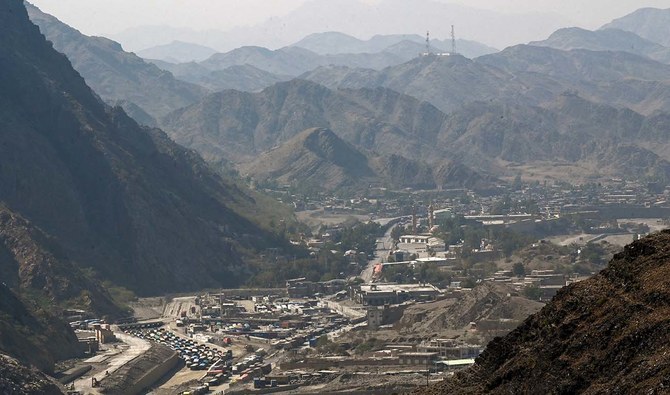
- The committee was formed to devise comprehensive strategies for holistic development in Pakistan’s border regions
- Key topics that came under discussion at the inaugural session included tariff rationalization, employment creation
ISLAMABAD: A high-level committee tasked with development of Pakistan’s border regions on Saturday held its inaugural session in Islamabad to discuss the challenges facing communities based in the country’s frontier regions, the Pakistani commerce ministry said.
The inaugural session of the committee, which was formed to devise comprehensive strategies for holistic development in these areas, was presided over by Commerce Minister Jam Kamal Khan, according to the ministry.
Key topics that came under discussion at the meeting included tariff rationalization and employment creation, reflecting the committee’s commitment to addressing border communities’ challenges.
“The committee aims to present its recommendations to the Prime Minister within 10 days, signaling a promising start to collaborative efforts for socio-economic development in the region,” the commerce ministry said in a statement.
Pakistan shares a long, porous border with Iran and Afghanistan, with people live along it relying on cross-border trade with little or no government tariffs, quotas, subsidies or prohibitions.
Islamabad last year announced restrictions on the informal trade to discourage smuggling of goods and currency in order to support the country’s dwindling economy.
Pakistan’s trade with China mostly takes place through formal channels, while the country’s trade ties with India, another neighbor it shares border with, remain suspended since 2019 over the disputed region of Kashmir.



